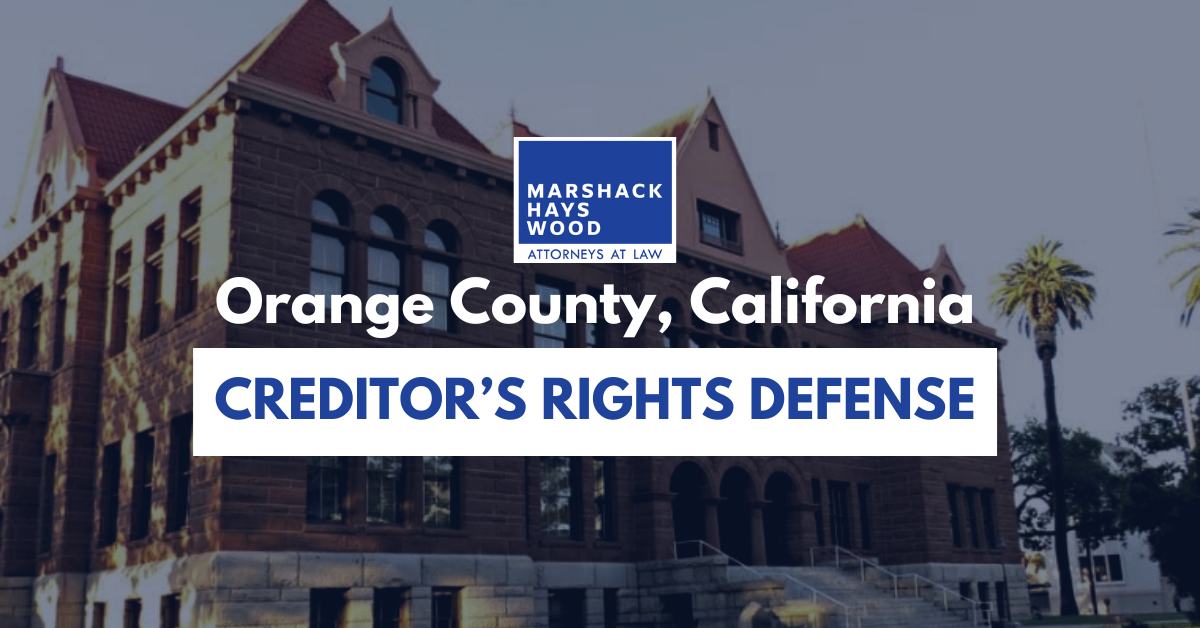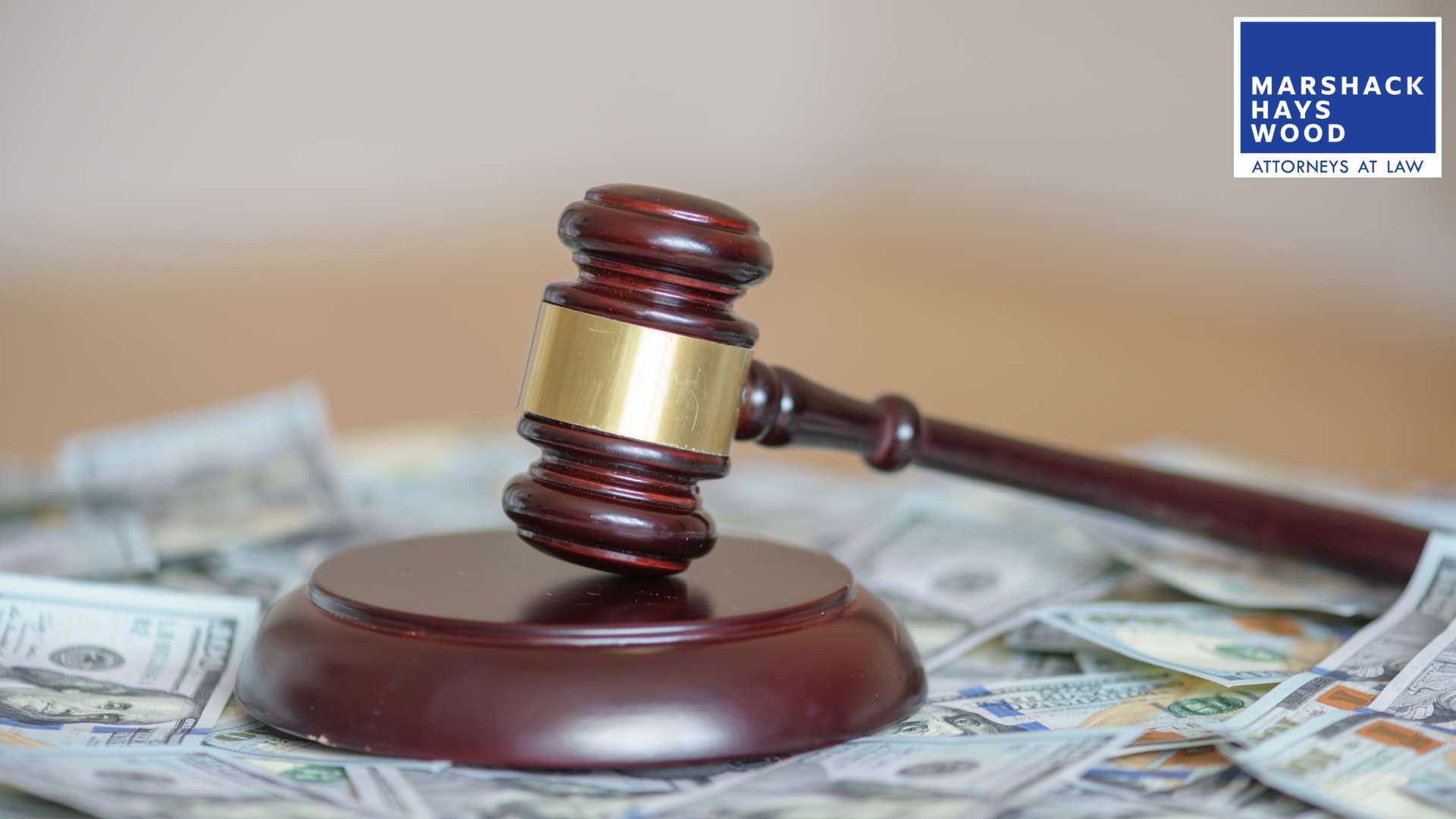Orange County Creditors’ Rights Defense
Home » Practice Areas » Creditors’ Rights Defense
Practice Areas
Creditor Rights Attorney in Orange County
Debtors have access to numerous resources that inform them of their rights regarding bankruptcy proceedings and debt collection practices, but creditors also deserve to be informed of their rights. When you need Orange County creditors’ rights defense, don’t hesitate to contact the legal team at Marshack Hays Wood.

Creditors’ rights outline the avenues through which a creditor can collect on a debt. If you are a California creditor seeking information about your rights, the Orange County bankruptcy lawyers at Marshack Hays Wood are here to help. Our lawyers have extensive experience in business litigation and insolvency proceedings, allowing them to successfully advocate on behalf of Orange County creditors.
To schedule a confidential consultation with one of our California creditors’ rights and bankruptcy attorneys, please call our office at (949) 333-7777 today.
What is a Creditor?
A creditor is an individual or financial institution that lends money to a person, group, or company under a loan agreement or contract. Creditors are classified as personal or real.
Examples of Creditor
Real creditors are banks or other financial institutions that have a legal contract or loan agreement with the borrower, granting them the right to seize the borrower’s real assets if the loan remains unpaid. Mortgage lenders, car dealerships, suppliers, vendors, and individuals can be real creditors.
A personal creditor is a friend, family member, or business that provides an individual or company with supplies or services, allowing for a delay in payment.
Creditor vs Debtor
Every credit relationship involves a creditor, who is the lender of the money, and a debtor, who is the borrower of the money. Creditors can provide secured loans, which are backed by asset collateral, or unsecured loans, which are not backed by asset collateral. A debtor who fails to meet the agreed-upon payment obligations is technically in default. When this happens, the creditor can take them to court.

California Collection Laws
Collections are an essential part of business, which is why laws governing loans and collections are so important. Just as the law protects debtors from unfair collection practices, so too are creditors protected to ensure that they can recover the amounts owed to them.
California collection laws give a creditor the legal rights and powers to enforce a judgment against a debtor. These laws are outlined in Part 2 of Civil Actions, Title 9, “Enforcement of Judgments” of the California Code of Civil Procedure (CCP). Title 9 also details which types of assets are subject to judgment enforcement. Keep in mind, however, that certain assets may be exempt from enforcement in debt collection proceedings. Furthermore, creditors should be familiar with California fair debt collection practices and how state law limits the ways in which they can collect debt.
Fair Debt Collection Practices Act (FDCPA)
The Fair Debt Collection Practices Act (FDCPA) is a federal law that restricts the actions of third-party debt collectors when collecting debts. The FDCPA outlines how collectors can contact debtors, even breaking down the time of day and the number of times they can initiate contact. If the debt collector violates the FDCPA, the debtor can sue the collection agency and the individual debt collector for damages and legal fees.
Bankruptcy Abuse Prevention and Consumer Protection Act
The U.S. Bankruptcy Code, found in Title 11 of the United States Code, governs all bankruptcy cases. Individuals and businesses may file under different chapters: Chapter 7 (liquidation), Chapter 9 (municipalities), Chapters 11, 12, and 13 (reorganization and repayment), and Chapter 15 (cross-border bankruptcies). Chapter 7 remains the most common, offering debt relief through asset liquidation and discharge of unsecured debts.
The Bankruptcy Abuse Prevention and Consumer Protection Act (BAPCPA), enacted in 2005, revised the U.S. Bankruptcy Code for cases filed on or after October 17, 2005. It made Chapter 7 filings more restrictive by introducing a Chapter 7 means test to determine eligibility, encouraging many filers to pursue Chapter 13 bankruptcy instead, which requires partial repayment before debts can be discharged. The Act also extended the waiting period between Chapter 7 filings.

What Can Creditors Do in California?
Creditors have several options for pursuing payment. With cooperative debtors, maintaining contact or negotiating reorganization plans may secure repayment. When debtors are uncooperative, however, creditors can turn to third-party collection agencies or sell the debt, though the FDCPA limits how collectors may operate.
Legal action is another option, including lawsuits or initiating involuntary bankruptcy proceedings. A successful case allows creditors to enforce judgments through wage garnishments, bank levies, or property liens. However, creditors must act within the statute of limitations for unsecured debts in California. Here’s a more concise breakdown of what creditors can do when it comes to collecting on debts:
- File a lawsuit for unpaid debt and, if successful, enforce a judgment
- Collect through garnishments, including a debtor’s income, bank accounts, or personal property (with limits under the law)
- Seek payment on old debts, even if the statute of limitations prevents filing a lawsuit
- Use debt collection agencies to pursue payment through calls, letters, or lawful pressure (regulated by the FDCPA)
- Sell the debt to another collector if repayment efforts are unsuccessful
- Negotiate repayment terms, often reducing or restructuring the debt
Because each case is different, working with an experienced attorney is essential. At Marshack Hays Wood, our lawyers can evaluate your situation and guide you toward the most effective legal strategy to recover what you’re owed.
What Can Creditors Not Do in California?
While they have several avenues for collecting debts available, creditors in California are limited by the techniques they use to collect the debt under both federal and state laws. Here is a breakdown of what creditors cannot do:
- Harass or threaten debtors with violence, obscene language, or repeated calls meant to annoy
- Misrepresent information about the debt, including the amount owed, their identity, or false threats of legal action
- Contact debtors at prohibited times, such as before 8 a.m. or after 9 p.m. without permission
- Call a debtor’s workplace if the employer prohibits such contact or if the debtor has requested they stop
- Share debt information with family, friends, employers, or third parties (except under limited legal circumstances)
- Collect exempt funds, such as Social Security, disability benefits, or veterans’ benefits, which are protected from garnishment
- Sue on time-barred debts, since California’s statute of limitations prevents lawsuits on certain old unsecured debts

Creditor Rights in California
California is considered a creditor-friendly state, giving creditors strong grounds to pursue repayment through legal action. If you have a valid claim against a debtor, you are entitled to seek recovery of the borrowed funds. While debtors may hire attorneys to shield their assets, creditors can (and should) work with legal counsel to protect their own interests. Because California law tends to favor creditors, many of these cases are resolved successfully in their favor.
Legal Rights for Secured Creditors
Generally, secured creditors have an advantage over unsecured creditors; they have collateral that can be used to satisfy their obligations. Before a secured creditor can recover collateral, they must file a lawsuit and obtain a judgment on what the debtor owes them. Therefore, a secured creditor’s provisional remedies focus on ensuring that the value of the collateral is protected during the pendency of litigation.
The most common provisional remedies available to secured creditors include the appointment of a receiver and a preliminary injunction:
- Receiver. Secured lenders can seek the appointment of a receiver, a court-appointed professional who takes control of the secured creditor’s collateral and protects it. This provisional remedy is often employed when the lender’s collateral is a parcel of income-generating property, and the borrower is engaged in mismanagement. Once appointed, the receiver reports to the court, not the secured creditor.
- Injunction. A secured creditor can obtain an injunction prohibiting the dissipation or destruction of collateral pending turnover. Although injunctions are difficult to obtain, they are often sought in connection with the appointment of a receiver.
Legal Rights For Unsecured Creditors
In litigation, an unsecured creditor’s recovery is more speculative. An unsecured creditor will often use a writ of attachment to obtain a lien against certain of the debtor’s assets, which improves the creditor’s ability to recover when litigation concludes.
- Writ of Attachment. When a debt is contractually based, the creditor can obtain a court order imposing a lien on certain debtor assets. Once the lawsuit concludes and a judgment is obtained, the lien serves as collateral that can be used to satisfy the obligation.
- Injunction. In certain situations, a creditor can obtain an injunction prohibiting a debtor from dissipating assets while the creditor takes the necessary steps to obtain a lien against certain assets (writ of attachment).
Creditor Rights in Bankruptcy
The bankruptcy process offers debtors a way to seek relief, sometimes wiping out most obligations through a discharge. Creditors, however, are not without protection. The U.S. Bankruptcy Code provides several remedies to ensure fairness when a debtor files, often in response to collection efforts like a writ of attachment.
Creditors can challenge a bankruptcy in several ways. They may file a motion to dismiss if the petition was made in bad faith, or pursue discharge litigation (§523) to prevent debts from fraud or misconduct from being erased. In some cases, creditors can seek discharge prevention or revocation (§727) if the debtor hides assets or fails to disclose financial information. Through a Rule 2004 exam, creditors can probe the debtor’s financial records and test the accuracy of disclosures.

Creditors also have the right to file a proof of claim to establish the debt owed or dispute claims filed by others. In reorganizations, they may object to the debtor’s plan if payments are unrealistic, unfair, or violate the absolute priority rule. Other disputes often involve the use of cash collateral, lien priority, or lien stripping, all of which impact repayment and asset protection.
Because bankruptcy litigation can be complex, working with an experienced attorney is essential. A skilled lawyer can represent creditors in adversary proceedings, protect their rights, and ensure disputes are handled efficiently and in their best interest.
Creditors' Rights Law FAQs
How long can a creditor collect on a judgment in California?
Creditors have 10 years to collect on a judgment, after which the judgment expires. However, under certain conditions, creditors may be allowed to seek a renewal of the judgment.
What legal options do I have if a debtor refuses to pay a valid claim in California?
If it seems that your debtor is having difficulty paying, offering negotiations or debt reorganization may help you secure payment. You can also send a letter of demand detailing the amount owed, the reason it is owed, and a deadline for payment. Should the debtor fail to respond, you may need to take further action.
At this point, you might consider filing a lawsuit or instigating an insolvency proceeding. Before taking action, however, it’s important to consult with an experienced Orange County lawyer like those at Marshack Hays Wood. After careful consideration of your case and which legal strategies will work best, your attorneys will build a case based on your needs.
How can I enforce a judgment against a non-paying debtor?
California allows creditors to pursue post-judgment remedies to enforce a judgment. You can collect money via wage garnishments, bank account levies, and other similar means of payment collection.
Can I recover payment from a debtor who has filed for bankruptcy?
Yes, but how much you can recover will depend on the type of bankruptcy the debtor filed for. An Orange County bankruptcy lawyer at Marshack Hays Wood can go over the details of debt collection for cases involving bankruptcy.
What rights does the Fair Debt Collection Practices Act (FDCPA) give borrowers?
The FDCPA provides borrowers with protections from abuse, unfair practices, and deceptive practices. While the FDCPA generally applies to third-party debt collectors, California law applies parts of the FDCPA to original creditors.
When should I hire a creditors’ rights attorney?
When you have concerns about collecting payment from a debtor, especially if you anticipate litigation, it’s important to consider dealing with the matter through an experienced Orange County attorney. A skilled lawyer can guide you through the process, ensure you act in good faith, and help you avoid costly mistakes while pursuing repayment.
At Marshack Hays Wood, our law firm has represented clients throughout Southern California for decades, handling hundreds of cases that touch on all aspects of creditors’ rights. Our attorneys work diligently to protect your financial interests and secure payment from debtors, giving you the professional support you need every step of the way.
Contact the Orange County Bankruptcy Attorneys at Marshack Hays Wood Today
When trying to collect on debt, it’s important to know your rights as a creditor. At Marshack Hays Wood, our bankruptcy and business litigation lawyers in Orange County can make sure you stay informed of your legal options. Our team has extensive experience helping clients navigate complex financial situations through legal prosecution and defense. We’ll use that experience to your benefit, defending your rights as a creditor and helping to protect your financial future.

Our knowledgeable lawyers use personalized legal strategies to help you obtain the best outcome possible. We can help you initiate court proceedings, sale transactions, and loan transactions to recover what you are owed.
If you’re involved in litigation with one of your debtors, call the attorneys at Marshack Hays Wood to schedule a free consultation by using our online contact form or calling (949) 333-7777 today.
READY TO GET STARTED?
At Marshack Hays Wood, our attorneys provide the legal support you need to move forward with confidence. Let us help you take the first step toward financial stability.
